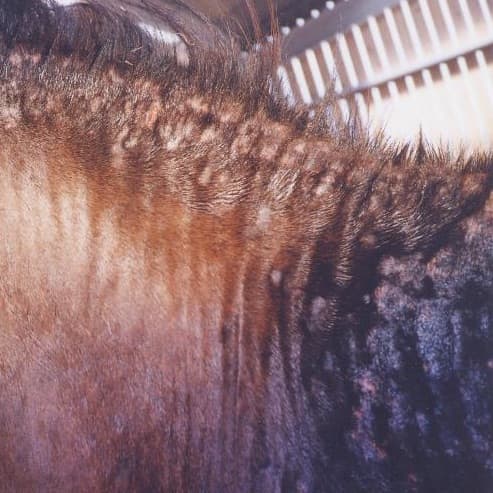Spring has nearly sprung and now is the time we must consider how to manage our horses comfort during the "itchy" season.
Cavalor Sw-itch is specifically designed to help your horse during this time. Here is some more information and helpful tips.
Summer eczema is known by many names: insect hypersensitivity, sweet itch, summer itch, Queensland itch, scratches, mud fever, dew poisoning and greasy heel, among others. Regardless of what you call it, any horse owner who has ever had to deal with this problem will not soon forget the horse’s incessant rubbing of its mane and tail. Many horse owners try numerous ointments and other topical treatments, often without success.
What causes this extreme itching response in your horse?
Summer eczema is the result of an allergic reaction to a small biting midge, usually culicoides. This insect thrives in moist, sheltered places and is endangered by drought. It is especially active around sunrise and sunset during the warmer months, generally in the spring and summer. It is extremely irritating to the horse.
My horse rubs, now what?
Despite the myriad of creams on the market, a miracle spray against abrasion from summer eczema has not yet been invented, and nothing is known to effectively cure the problem for good. However, here are some tips that will help keep summer eczema under control and make the situation bearable for horse and owner.
Avoid contact with the cause!
These insects prefer to stay near bushes, waterways and decaying plant material that is moist and wind-free. They are not often found in an open meadow with lots of wind or in a clean, shaded stable. Stabling the horse in the early morning and at dusk, when the mosquitoes are swarming, and feeding modified whey are good first steps to take.
Medication is only a short-term solution.
Providing medications such as corticosteroids and antihistamines obtained from your veterinarian can help with the horse's allergy level and thus reduce the urge to itch. In the long term, however, this is not the solution. Prolonged use of medications may trigger too many side effects in the horse.
Cavalor Sw-Itch keeps mosquitoes at a distance so that your horse is no longer plagued by the inevitable itching. If the horse already has summer eczema, Cavalor Sw-Itch will help keep the itching under control. Some patients need to be treated daily, while for others a few times a week will suffice.
Another tip: Beginning in the spring, start applying Cavalor Sw-Itch to lubricate the area before itching starts.
There can be serious injuries to mane and tail due to the itching. It is wise to shave the hair that has not been rubbed off and to wash the inflamed skin areas with a disinfectant shampoo (such as Cavalor Hygienic Wash) and after treatment with Cavalor First skin 8 Spray.
About the Author:
Dr. Bruno Beyne is an equine veterinarian in Bruges, Belgium.




